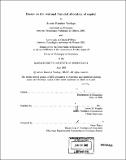Essays on the real and financial allocation of capital
Author(s)
Ramírez Verdugo, Arturo
DownloadFull printable version (6.562Mb)
Other Contributors
Massachusetts Institute of Technology. Dept. of Economics.
Advisor
James M. Poterba.
Terms of use
Metadata
Show full item recordAbstract
This dissertation consists of three papers studying how firms allocate real and financial capital, and how taxes, the labor market and asymmetric information affect these allocation decisions. The first paper studies the response of business investment to taxes. I use the variation provided by recent reforms to the Mexican tax system, including the elimination of accelerated depreciation for investment outside the main metropolitan areas. I show that investment is very sensitive to tax changes (an elasticity of investment with respect to the user cost around -2.0), mainly due to the small open economy nature of Mexico: large responses of multinationals and large elasticity of imported assets. I also show that investment behavior is consistent with nonconvexities and irreversibilities. The results are robust to different specifications and instrumental variables approaches, and are not an artifact of tax evasion. The second paper studies the link between payout and unionization. Signaling models suggest that dividends are used to convey information about future earnings to investors. However, if unions also receive these signals, managers will be less inclined to send the signal, preventing unions from using this information when bargaining for higher salaries. (cont.) Using data from IRS 5500 Forms to measure firm unionization, I find dividends to be better predictors of future earnings in non-unionized firms. Results are robust to different specifications and time periods, as well as to an instrumental variables approach that uses state level right-to-work laws to address unionization endogeneity. The third paper, joint with Antoinette Schoar, studies the presence and extent of Performance-Based Arbitrage (PBA) in the money manager industry. PBA (correlation between past performance and assets given by investors to arbitrageurs) prevents arbitrage from equalizing prices and fundamental values. We document the presence of PBA and show it might be profitable for investors. We show that PBA is stronger in periods of lower returns and higher volatility, and it is stronger in equity versus fixed income markets. However, we also show that PBA is weaker among managers that use arbitrage strategies, suggesting that although PBA exists, its effect on security prices might be small.
Description
Thesis (Ph. D.)--Massachusetts Institute of Technology, Dept. of Economics, 2006. Includes bibliographical references.
Date issued
2006Department
Massachusetts Institute of Technology. Department of EconomicsPublisher
Massachusetts Institute of Technology
Keywords
Economics.